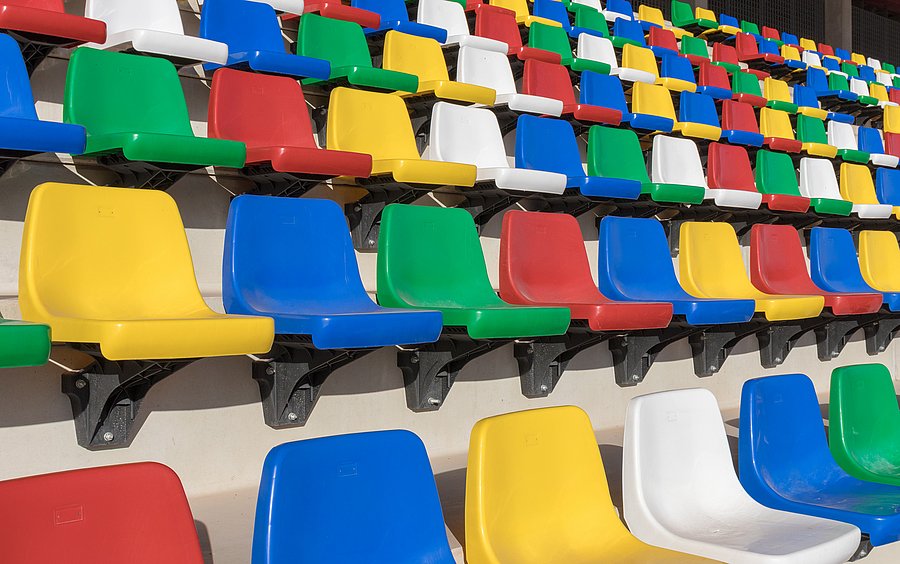Sociology of sport
Racism is part of everyday life in club sport in Germany

Colourful rows of seats in a sports arena - a symbol of diversity that is not yet lived everywhere in club sport. // Photo aitorserra - stock.adobe.com
"Racism in sport is often dismissed as an isolated incident or the misconduct of individuals," explains study director Prof Dr Tina Nobis. "However, our study results make it clear that racism in sport is omnipresent and part of everyday life. Racism is also subtle and structural."
In a qualitative interview study, ten out of eleven athletes of African descent reported multi-layered forms of racism, including racist jokes in the changing room, the experience of being otherised, the collusion of belonging or a lack of representation in primarily white sports structures.
White Privileges and a lack of awareness
The athletes interviewed described how they are not believed when they report racism and that racism is downplayed or denied. "Racism usually only leads to a disruption in the everyday sporting life of those affected," says co-author Alessa Heimburger. Athletes report that racism in club sport tends to be kept quiet rather than talked about. According to the research team, this also materialises a white privilege - namely that of being able to ignore racism.
In addition to the qualitative interview study, the research team also conducted a quantitative survey of over 3,000 club members, the majority of whom are not affected by racism. The results of the online survey make it clear that the majority of white sports club members do not recognise more subtle and structural forms of racism in particular, such as the constant questioning of origin or a lack of diversity on management boards, as racism.
Racism and criticism of racism not categorised as relevant
In a partial survey of 635 sports club members who work in an honorary or full-time capacity, it also became clear that the topics of racism and criticism of racism play a subordinate role in sports clubs and are also largely classified as irrelevant. Just under half of those surveyed stated that the guarantee of equal rights, the reduction of discrimination and the possibilities of anti-racist work are not discussed in their clubs and that these discussions are not necessary.
"The results show that whiteness is anchored as a social norm in sport," says co-author Lara Kronenbitter. "The privilege of supposedly not having to deal with racism as a white person is part of the problem." Nevertheless, the results of the quantitative survey also show that there are starting points for criticising racism in club sport and that some sports clubs are already implementing measures that are critical of racism, such as projects against discrimination and racism or that protection against discrimination is enshrined in the club statutes. However, there is a lack of nationwide structures.
Call for structural changes
The research team emphasises that criticism of racism is a process that requires perseverance and continuous engagement with the issues of racism and criticism of racism. Criticising racism requires more than symbolic actions or social media statements. Long-term changes in the structures of organisations are necessary:
- Establishment of independent complaints centres and clear sanctions,
- racism-critical training for coaches and officials,
- more representation of BIPoC people (Black, Indigenous, People of Colour) in leadership positions
- and a conscious examination of whiteness and white privilege.
"As long as racism is not recognised as an everyday structure, there will be no real change," says co-author Dr Priscillia Musoh Manjoh. "Criticising racism means reflecting on your own privileges - and giving up power."
About the study
The study was conducted as part of the research project "Racism and anti-racism in organised sport", which was led by Prof. Dr. Tina Nobis at the Department of Sports Sociology at the University of Wuppertal. This independent research project is part of the project "(Anti-) Racism in Organised Sport", which was carried out by the Deutsche Sportjugend e.V. (dsj) in cooperation with the Deutscher Olympischer Sportbund e.V. (DOSB) and funded by the Federal Government Commissioner for Migration, Refugees and Integration and the Federal Government Commissioner for Anti-Racism.
The full report is available on the website of the working group:
